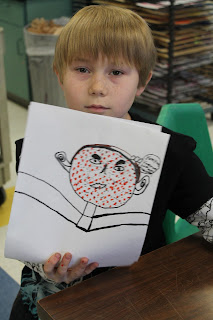During yesterdays class, I let each table choose one color to use. I should have realized this before I did it, but it was a slight mistake on my part, as I ended up with three tables who chose green, two blues, and an orange. As they started mixing their shades, the table that chose orange started commenting on how brown the orange started to get. It was at that point that I realized I should have gone about the color choices a little bit differently, so I changed it up for today's class.
Today, I made sure each of the primary and secondary colors were handed out. Each table received an egg flat with one hole filled with red, for example, for each table member. There was enough white for each person, and then a hole filled with black. I had the students draw out 10 ice cream scoops real quick and then they painted one scoop the regular color.
Then, we moved onto tints. I had students take a small amount of their color and add it to the white, paint a scoop, and repeat until they had painted 5 tints. Before we moved onto shades, we discussed how it's always easier to make something darker but difficult to make something lighter without wasting paint. So, I had the students take a small amount of black on their brush, and mix it in with the remaining regular color they had left. We repeated the process for the last four scoops of ice cream.
I demonstrated mine on the board using the sky blue tempera paint, whereas the blue table used regular blue paint. This way, they will be able to see the difference between the two blues.
Next class, we will cut out and put our ice creams together on top of a drawn cone. I'll have the students put their ice cream scoops in order from darkest to lightest. Then, in the class that follows, we will look at the six colors side by side and have a critique of the colors. We'll discuss what happens to colors like yellow and orange when you add black. We will continue our Common Core connection in this unit by reading the short article in the September issue of Scholastic Arts about Picasso's blue period guitarist. We'll talk a little about emotions in color, and then have students choose which monochromatic color scheme they want to use for their painting. And FINALLY, we will get to painting like Van Gogh!
























































